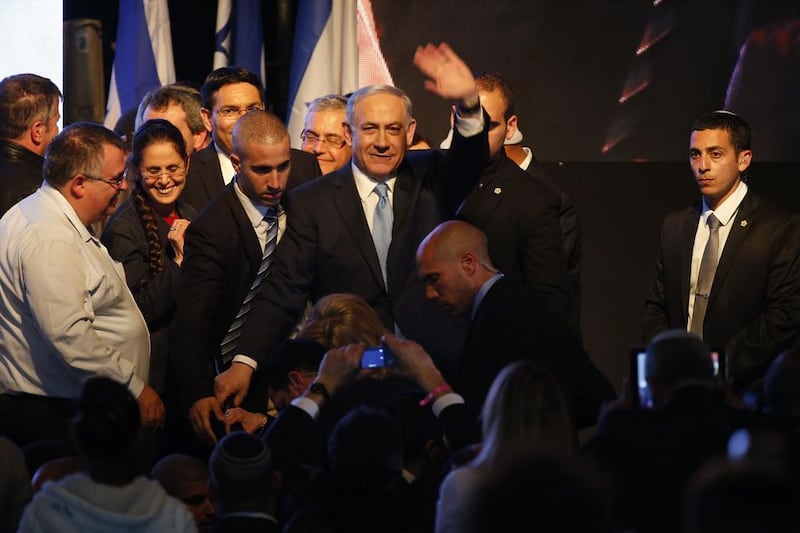JERUSALEM // Palestinians on Wednesday called for international help to defeat Benjamin Netanyahu’s vow to deny them statehood, with hopes of a moderation in Israeli policies evaporating as the scope of the hardline prime minister’s victory became clear.
“Now, more than ever, the international community must act,” said top Palestinian negotiator Saeb Erekat. “It must rally behind Palestinian efforts to internationalise our struggle for dignity and freedom through the International Criminal Court and through all other peaceful means.’’
Mr Netanyahu swept to a stunning victory yesterday despite a rollercoaster election campaign, with his right-wing Likud party winning 30 of the 120 seats at the polls. His closest rival Isaac Herzog’s centre-left Zionist Union took 24 seats.
In separate remarks to Ramallah-based radio station Voice of Palestine, Mr Erekat said the Palestinians would now intensify the effort to isolate Israel diplomatically, pursue war crimes charges against it and proceed with plans to end cooperation between their security forces.
Meanwhile, Arab citizens of Israel, who make up a fifth of the population, were buoyed by the impressive electoral showing of the Joint List, an alliance of four previously fractious Arab groupings, that won 14 seats and became the third largest party in Israel’s parliament, the Knesset.
“The result shows that coming together was a genuine desire of the public and that we became more powerful by uniting,” said Hana Amoury, a political activist from Jaffa. Still, she was dismayed at the renewed mandate for Mr Netanyahu, which she said “shows the Jewish public claps its hands for racists”.
Just a day before the election, the Israeli leader bluntly promised voters that if he gained a new term, there would be no Palestinian state, a stance that marked a reversal of Israel’s previous qualified endorsement of such statehood.
It is now even more difficult for the moderate Palestinian president Mahmoud Abbas to expect a resumption of the Israeli-Palestinian negotiating process in the foreseeable future. Intermittent peace talks have been held fruitlessly since the 1993 Oslo Agreement.
Mr Netanyahu also promised right-wing voters there would be a surge in Israel’s illegal settlements in the West Bank and East Jerusalem.
Palestinian aspirations for a state comprising the West Bank and Gaza, with East Jerusalem as its capital, had often been threatened before but now seem even more illusive after this election.
In the view of Ghassan Khatib, vice president of Bir Zeit University in the West Bank and a former Palestinian Authority minister, the “two state solution” of an independent Palestine emerging alongside Israel will be hard pressed to survive another four years of Mr Netanyahu.
“If he is given a free hand this will bury the practical possibility of two states and as a by-product, bury the Palestinian moderate leadership that has been gambling on a two state solution.”
In his view, only a “serious internationalisation strategy” by Mr Abbas could save Palestinian statehood. He said this should entail joining more international agencies; going back to the UN, where a resolution on statehood at the security council failed in December; encouraging prosecutions of Israelis in the ICC; and supporting the work of the international Boycott, Divestment and Sanctions movement against Israel.
Talal Awkal, a columnist for the Palestinian Al Ayyam daily newspaper who writes from Gaza City, predicted there will now be more settlement building and efforts to transform Jerusalem at the expense of Palestinians "because Netanyahu feels he is so strong and widely supported by the people".
In addition, there will be a continued freeze on the transfer of tax monies that are vital for the Palestinian Authority to pay its 155,000 employees, Mr Awkal said. Israel froze the transfers in January after the Palestinians applied to join the ICC. Israel froze the transfers in January after the Palestinians applied to join the ICC.
On a positive note, Mr Awkal predicted that the international community would react to Mr Netanyahu’s election with increased sympathy towards the Palestinian cause, which might help them in the pursuit of war crimes cases against Israelis in the ICC.
According to Alon Liel, the dovish former director-general of the Israeli foreign ministry, the election results “lock out” the Palestinians from any hope that change in their favour will start in Israel. “The battle of the Palestinians now is to go abroad to the UN, to Europe, to international organisations. They have nothing to look for from the Israeli public,” he said.
But Mr Liel said it would be a mistake for Palestinians to pin their hopes on Washington.
“The US has proven to be very weak,” he said.
Even with Mr Netanyahu openly challenging the administration by addressing Congress on Iran against its wishes, “they didn’t make him pay politically”, he said.
“I don’t see any big change in Israeli relations with the US from the election. The Palestinians must turn their eyes to Europe, to international organisations, to legal organisations such as the ICC and UN. They don’t have much hope in Washington. Washington will move only if Europe leads.”
Aida Toma, who was elected to the Knesset on the Joint List, said Mr Netanyahu’s re-election portended difficult times ahead for Israel’s Arab minority. She noted that in addition to ruling out Palestinian statehood, on election day the premier had issued a “racist” call to his supporters to vote because Arab citizens were voting “in droves”.
“We are heading to very difficult times and we have to be alert and aware,” she said. “We will be facing policies that won’t be easy for the forces against occupation and racism, or for the Palestinian citizens of Israel.”
foreign.desk@thenational.ae





